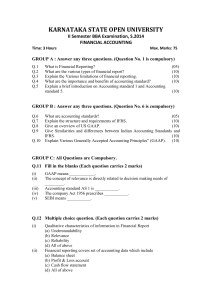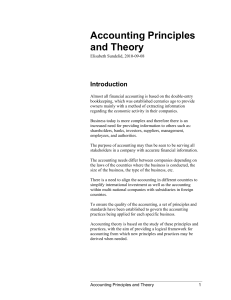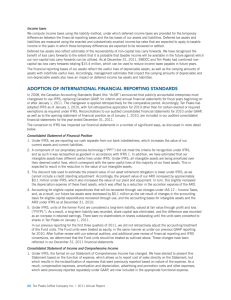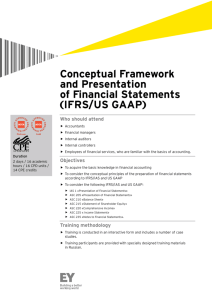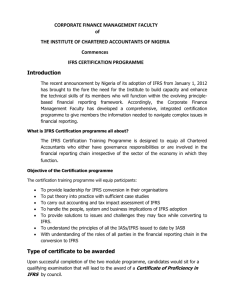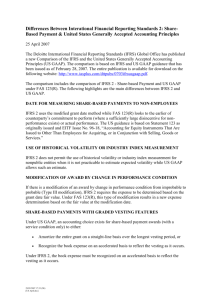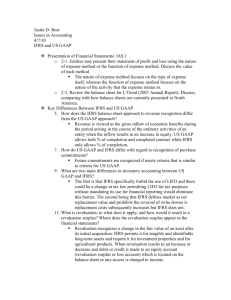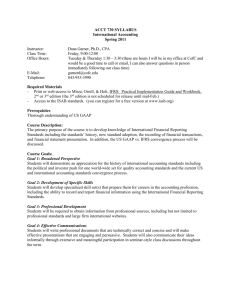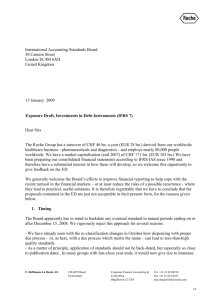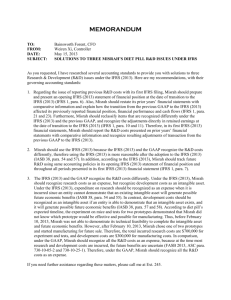IFRS Paper - Elizabeth Keithley Portfolio
advertisement
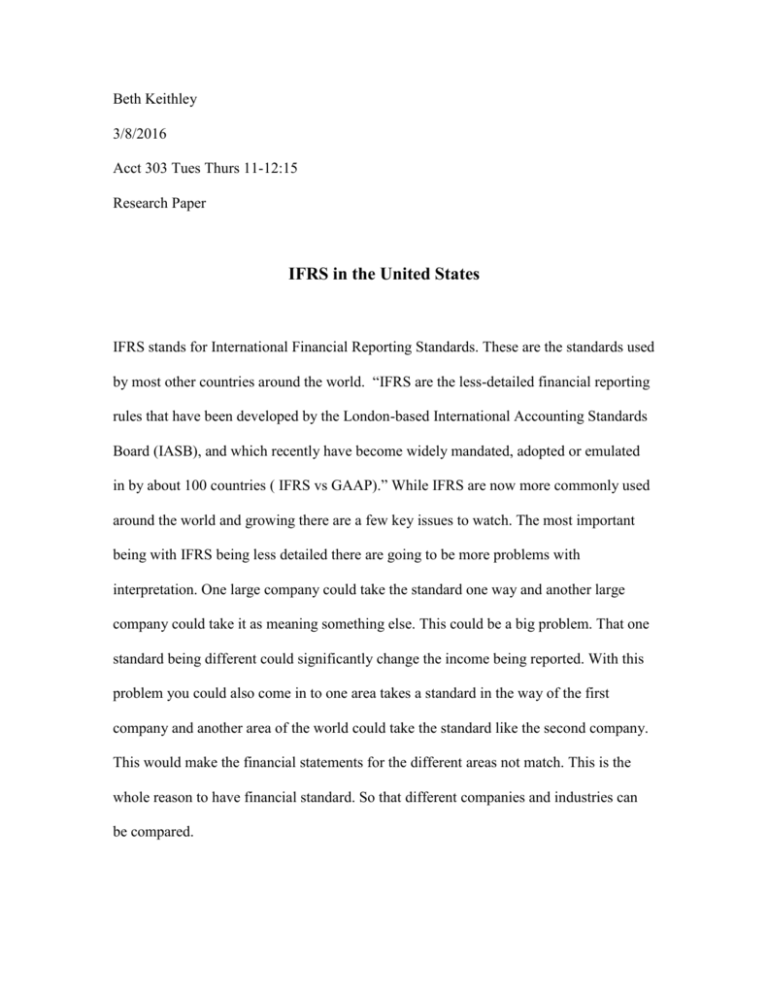
Beth Keithley 3/8/2016 Acct 303 Tues Thurs 11-12:15 Research Paper IFRS in the United States IFRS stands for International Financial Reporting Standards. These are the standards used by most other countries around the world. “IFRS are the less-detailed financial reporting rules that have been developed by the London-based International Accounting Standards Board (IASB), and which recently have become widely mandated, adopted or emulated in by about 100 countries ( IFRS vs GAAP).” While IFRS are now more commonly used around the world and growing there are a few key issues to watch. The most important being with IFRS being less detailed there are going to be more problems with interpretation. One large company could take the standard one way and another large company could take it as meaning something else. This could be a big problem. That one standard being different could significantly change the income being reported. With this problem you could also come in to one area takes a standard in the way of the first company and another area of the world could take the standard like the second company. This would make the financial statements for the different areas not match. This is the whole reason to have financial standard. So that different companies and industries can be compared. Another thing that will be important to watch is how Europe changes in this economy using IFRS. If Europe can not get out of this World Wide recession it will not be a high point for the standards that they have chosen. Being that they are trying to make these the standards that the whole world follows they need to prove to the countries that don’t follow them that they are sound standards. If this can not be proven then it is unlikely for these standards to be adopted as world wide standards. As of 2008 many countries had already adopted IFRS as the standards the country is to use when reporting financial statements. Some of the notable places that have adopted the standard are the European Union, Russia, China, Iceland, Australia, Brazil, Some Middle Eastern countries, and fourteen African countries. Many other countries are planning on converging soon. Some of which are Canada, Mexico, Chile, Japan, India, Korea, and most other Middle Eastern countries including Israel. Only two countries are still following GAAP but are in talks to converge at come point. Those two counties are the United States and Columbia. There are some countries that are not even considering the change. Most of those countries are in Africa and couple in the Middle East. FASB and IASB have plans to converge the two systems in the future. When depends on what issues each is willing to change to work with the other. Right now they are working on short term projects with in converging. Some of the projects that have been discussed are business combinations, goodwill and other intangibles, long lived assets for sales, and fair value measurement. Even though they have gone through all these sections together both still have differences that are noticeable between their standards. The major differences that they still have to discus and change are inventories, share based payments, long live assets with impairment, consolidation, and pensions. When discussing inventories the major difference is LIFO (last in first out). The United States FASB is in favor of using LIFO. IFRS is in favor of eliminating LIFO. FASB’s reasoning is that some companies have a reason for using LIFO. Such as companies with high inflation, that pile new inventory on top of old inventory like gravel companies and companies that have no difference in old and new products. When discussing share based payments there are three areas to look in to. First is the classification of the shares. The first one being looked at is putable shares. This is when an investor can sell back the share to the company for a given price. The second one is the attribution. The main thing being looked at in this section is the graded vesting. This is when employees have to earn the right to a percentage of their retirement plan after a given time and then earn an additional percentage every year until they are fully invested. How to account for this between the two is still being discussed. The third one is deferred income taxes. IFRS measures the deferred tax asset by what is expected to be deducted. They also reevaluate every year before doing the taxes. On the other hand GAAP measures the deferred tax asset based on fair value. Also once the amount that is deferred is stated it does not change in the next years. These differences need to be discussed and one set of standards will need to be changed. When discussing long lived assets with impairment there are a couple things to look at when it comes to differences. For IFRS each component of the asset is depreciated separately. Also any subsequent costs can not be capitalized. Using GAAP the total asset is depreciated not each part of the asset. Any subsequent costs are capitalized after impairment. This means that one side has to give on each of these issues. When discussing consolidation there are three main differences. First with IFRS, voting is consolidated into how much power you have. Second, uniformity is expected for all financial statements. Third, investment companies while exempt from equity method must still consolidate. GAAP is based on voting interest not consolidated power. Uniformity is also not expected in financial statements. Investment firms are exempt from equity method and consolidation. These are going to be big issues of discussion when we come around to talking about changing them. The reason being that changing this in either set of standards will affect a large portion of the people who use this area of the standards. When discussing pensions there are two issues to be discussed. With IFRS first they recognize the money that has been earned through the straight line method. They take the past years worked over the time they expect them to work before they benefits are needed and the benefits are given when they have reached the appropriate amount of time. If the person is already getting services the cost should immediately recognize the cost. For GAAP they use the future value of that is expected to be used when the people will be receiving the services. For depreciating it is suggested that most of the depreciation is done in the beginning of the plan. These subjects are going to have to be discussed in depth to make sure that no one is left with out benefits at a later time. Fort the companies that are worried about any changes that are going to happen there are some things that you should do. First look up the issues that are going to be discussed and see what if any of the issues are going to affect your company. Any issues that you believe will affect your company you should look in to what it would change to under the new standards. If you do not approve of what would be changed you should look and find out when the issue is planned to be discussed. After the discussions there is a period of time that companies can make comments about what they believe should be change about the standard and how it would affect them. If it is a serious issue I suggest commenting to the board. In the mean time you should be looking in to how to change the way that your company adheres to the standard. If it is something that will take a lot to change figure out what you will have to do and start compiling what you may have to do. It will be best if you are prepared for any outcome. If you know what is coming and what might change you will be in the best position incase it happens because you will already have prepared. Bibliography Graded Vesting. (n.d.). Retrieved December 8, 2012, from Investopedia website: http://www.investopedia.com/terms/g/graded-vesting.asp#axzz2EUvczRcK Hall, K. M. (Presenter). (2009, February 13). IFRS: The Road to Conversion. Lecture presented at Towson University, . IFRS versus GAAP. (n.d.). Retrieved December 8, 2012, from IFRS vs. GAAP a service of Dr. Barry J. Epstein, CPA website: http://www.ifrsaccounting.com/ Putable Common Stock. (n.d.). Retrieved December 8, 2012, from Investopedia website: http://www.investopedia.com/terms/p/ puttablecommonstock.asp#axzz2EUvczRcK
